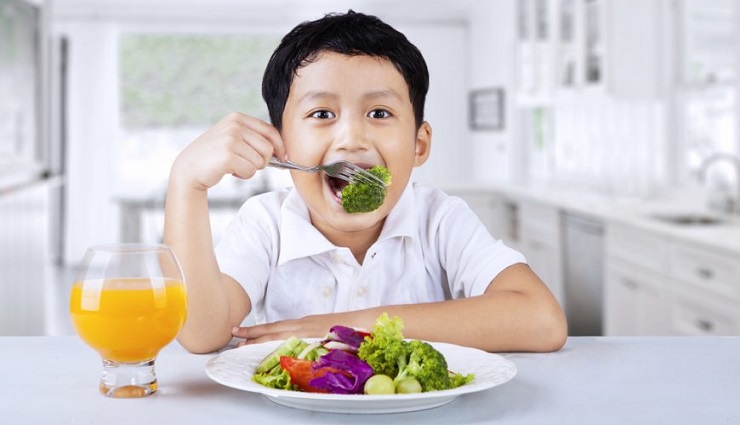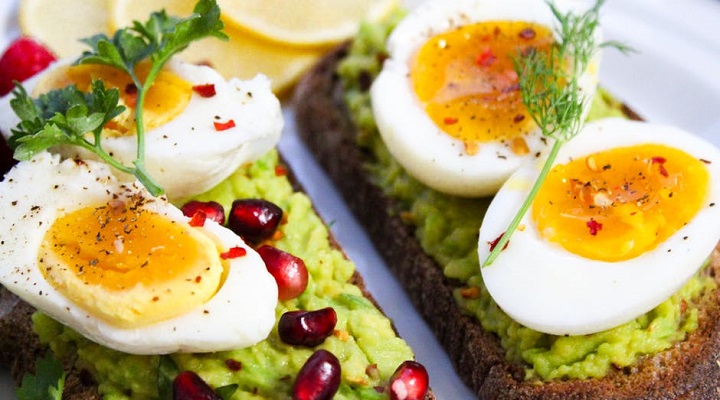What to eat to strengthen children’s memory: Do not neglect these 12 foods

Nutrition plays an essential role in children’s brain development. For this reason, you should know what is better to eat to strengthen children’s memory. Nutrient intake plays a significant role in early development, concentration, and learning ability. In the following, we explain the role of food in brain development and introduce you to healthy foods for children. Stay with us to learn about meals, breakfasts, and helpful snacks to strengthen memory.
What role does nutrition play in brain development and memory enhancement?
The most significant growth of the brain occurs in the first few years of a child’s life. A child’s brain reaches 80% of its adult weight by the age of 2 years. All nutrients affect brain growth and function, but according to a 2017 study, these nutrients are essential for early brain development:
- protein;
- carbohydrate;
- long-chain unsaturated fatty acids;
- choline;
- are ;
- copper;
- zinc;
- vitamin A ;
- vitamin B group;
- vitamin C ;
- vitamin D ;
- iodine;
- Selenium.
The first three years of a child’s life are crucial for brain development. Suppose the brain does not have access to enough nutrients during this period and does not grow sufficiently. In that case, it may cause long-term impairments in learning, mental health in adulthood, and job performance.
Nutrition is one of the essential ways to strengthen memory at the beginning of brain development. Still, social support and dependence, as well as reducing pain and inflammation, also have an effect to some extent. Of course, diet can also affect children’s behaviour and concentration. According to research, a diet rich in simple sugars and saturated fat can increase the risk of hyperactivity and attention deficit disorder ( ADHD ).
What should children eat to strengthen their memory?
1. egg
Eggs are considered one of the most nutritious foods and are fortunately popular among many children. This food is rich in essential nutrients for brain development, including:
- choline;
- vitamin B12 ;
- protein;
- selenium
According to research, consuming choline in the first 1000 days of a child’s life can lead to brain development and protect brain cells from damage. Most people’s need for choline is met by eating eggs. A large egg with its yolk contains 125 mg of choline, which provides half the daily requirement for children aged 4 to 8 years.
Your child should have a boiled egg or an omelette with vegetables for dinner and lunch.
2. Berries
Berries have beneficial plant compounds called anthocyanin. This combination has various beneficial effects on the brain. The use of berries can increase blood flow to the brain, have anti-inflammatory effects, and strengthen the construction of new nerve cells and some proteins that play a role in learning and memory.
Several studies have shown berries’ positive effects on children’s brain function. For example, in a study involving 14 children aged 7 to 10, children who consumed 200 grams of blueberry or blue raspberry drink remembered words significantly better.
Additionally, research has shown that low consumption of berries and other fruits and vegetables leads to poorer mental performance in 6- to 8-year-old children.
3. Seafood
Seafood is a rich source of nutrients, and omega-3 fats, iodine, and zinc are essential for brain function. For example, the body needs zinc to produce and develop nerve cells, and omega-3 fats are necessary for the brain’s normal functioning. Also, the body needs iodine to make thyroid hormones essential to brain development.
Many studies have confirmed the connection between seafood consumption and better mental performance in children and adolescents. Eating fish leads to a better IQ score and better performance in school. In addition, the lack of omega-3 fats in the blood can negatively affect children’s mental performance.
Due to pollutants such as mercury that accumulate in some types of seafood, consuming too much fish can negatively affect brain function. For this reason, it is better to use seafood that is low in mercury, such as oysters, shrimp, salmon, salmon, and herring.
You can use salmon or tuna in a variety of dishes and sandwiches. Grilling fish is also an excellent way to add it to children’s diets.
4. Green leafy vegetables
Convincing your child to eat leafy greens may be difficult, but it’s worth it. These nutritious vegetables are essential for your baby’s brain health. Leafy vegetables such as spinach, kale, and lettuce contain folate, flavonoids, carotenoids, and vitamins E and K1 that protect the brain.
According to research, children who consume enough folate have better mental performance than children deprived of enough folate. In addition to improving mental activity, carotenoid accumulates in the retina and improves vision.
5. cocoa
Cocoa and cocoa products are one of the richest sources of flavonoid antioxidants. These compounds can reduce inflammation and protect the brain, thus contributing to brain health. Cocoa increases blood flow to the brain and improves visual processing. This substance improves mental performance in some activities, even in adults.
6. Orange
Orange is one of the most popular citrus fruits and is considered one of the children’s favourite fruits because of its sweet taste. Adding oranges to your child’s diet not only improves his general health but also plays a role in strengthening his memory and mental health.
According to research, oranges and orange juice can help the activity of nerve cells and increase blood flow to the brain. Oranges are also rich in vitamin C, which plays an essential role in brain development and the production of neurotransmitters.
Adults with enough vitamin C can perform better in activities requiring concentration, memory, attention, quick decision-making, and judgment.
7. yoghurt
Encouraging children to eat yoghurt for breakfast or a snack is a great way to boost their memory. Dairy products like yoghurt are a rich source of iodine, which the body needs for brain development and good mental activity.
Children who do not get enough iodine are more prone to mental disorders. Iodine deficiency is more common in pregnant women and children, especially in poor areas. In addition to providing the necessary iodine, yoghurt is rich in other sources such as protein, zinc, vitamin B12, and selenium.
Eating breakfast plays a vital role in children’s mental performance. Children’s brains need more glucose than adults. For this reason, eating a breakfast rich in brain substances, such as yoghurt with berries, cocoa, pumpkin seeds, oats, nuts, and bananas, can play a significant role in a child’s brain health.
8. Foods rich in iron
Iron deficiency is one of the most common complications worldwide and is more common among children. A decrease in blood iron can affect children’s mental development and learning. Iron deficiency is also associated with attention deficit hyperactivity disorder or ADHD.
You should add iron-rich foods to your child’s diet to prevent iron deficiency. These foods include:
- red meat, poultry, seafood;
- types of beans;
- spinach
The body absorbs heme iron found in meat foods better than non-heme iron found in plant foods.
Your child should have a mixed diet of both iron and non-iron sources. Adding vitamin C to other iron-rich foods can also increase its absorption. For example, you can add lemon juice to spinach salad.
9. Nuts and seeds
Nuts and seeds also have a lot of brain matter and are rich in nutrients that are good for brain function, including:
- vitamin E;
- Zinc _
- folate;
- are;
- Protein.
According to research, brains add beneficial fats, protein, and fibre to children’s diets and improve the quality of the diet, which has an essential relationship with learning and strengthening memory.
10. Beans and lentils
Beans and lentils have zinc, which is vital in children’s brain development and average growth. One glass of cooked lentils contains 2.52 mg of zinc, half the daily requirement of children aged 4 to 8 years. Beans can be used in soups, stews, and soups. The softness of red beans makes them ideal for younger children.
11. Two heads
Halimferangi with oats is one of the low-sugar foods that can improve mental abilities. Halimperangi, made with whole-grain oats with nut butter or roasted nuts, can be a balanced meal for children. Children allergic to nuts can use eggs or yoghurt as a source of protein to achieve balanced blood sugar.
Ideal breakfast for preschool children
Children can eat these breakfasts before going to school to have the most concentration and mental activity:
- Boiled or half-cooked eggs with whole grain bread;
- Haleem oats with nut butter or berries;
- A drink made from spinach, Greek yoghurt, blueberries and apples;
- Whole grain bread with salmon and avocado.
The best foods to improve memory while studying
Eating balanced snacks while studying can regulate blood sugar levels and improve concentration. These snacks are ideal for when kids are looking:
- Carrots and hummus (made from crushed chickpeas);
- Mashed avocado with oat bread;
- protein snack made with oats, cocoa powder, and nut butter;
- A snack consisting of raw nuts, seeds, and coconut.
Common questions
1. Is nutrition adequate in strengthening children’s memory?
Yes. Scientific studies have proven this. Nutrition and snacks, especially in the first three years of life, play a vital role in brain development, strengthening the child’s intelligence and learning ability.
2. What are the best foods to strengthen children’s intelligence?
Eggs, berries, seafood, and green leafy vegetables are the best foods to boost your child’s intelligence and memory. Including oranges, yoghurt, beans, and lentils, foods rich in iron and cocoa in their diet is better.
final word
Suppose you want to know what to eat to strengthen children’s memory. In that case, you should follow a balanced and healthy diet so that the child’s health and mental development are possible. According to research, the foods mentioned in this article can be essential to brain function and cognitive development. Using these ingredients instead of snacks and sugary or fatty foods will have significant and long-term effects on your child’s mind.








